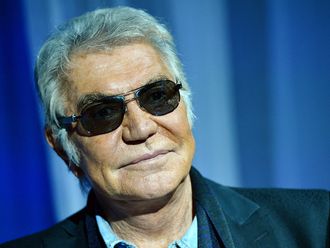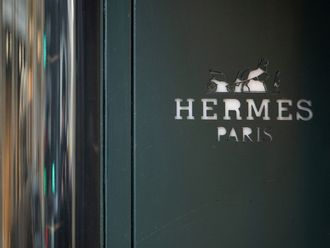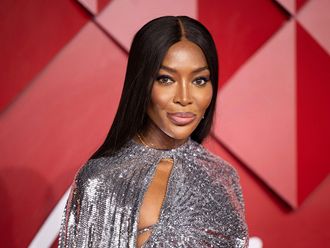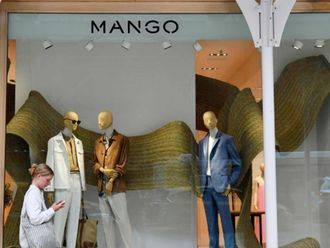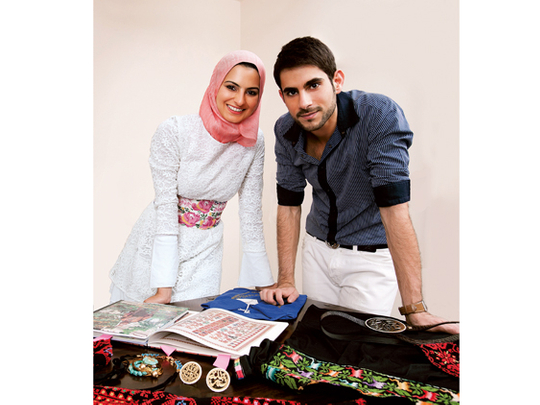
They are hunched over, eyes scrunched up as they concentrate on the needles,
tired yet nimble fingers working the pieces of cloth they’re embroidering in
bright colours.
The women are Palestinian refugees, inmates of the Al Biqaa refugee camp in Jordan that houses 100,000 refugees.
The decades of occupation Palestine has suffered have put their culture and livelihood in jeopardy. And it has taken a young Palestinian woman to put that right. Zeina Abou Chabaan is the reason these women are now sitting around bare tables, embroidering patterns that hark back to happier times.
The 29-year-old Dubai-based founder of the fashion label Palestyle is not doing charity work however. She’s here to showcase the ancient art of Palestinian embroidery through the fashion pieces her company creates, and also to see that
the refugee women get a fair deal.
“The idea is to showcase a dying art, and thus help the Palestinian women stand on their own feet,” says Zeina.
She’s doing just that by putting the refugees on the world stage through the Palestyle bags, dresses and accessories that celebrities like Eva Longoria and Lily Cole wear on the red carpets.
“A percentage of each Palestyle bag or clutch or dress or piece of jewellery that is sold ensures that they lead a better life,” she adds.
Helping women to help themselves Creators of fashion labels usually do so because they love to create. Any social cause they can serve comes much later, if at all. In the case of Zeina it was the other way around. She’d always wanted to help the Palestinian women in refugee camps, in countries like Jordan and Lebanon, lead a life of dignity.
Thus was born Zeina’s ‘social project’ that provides employment to refugee women in the Jordanian camps. Five per cent of the income from the sale of the items is ploughed back into welfare schemes for the refugees through NGOs.
The embroidery by the women refugees is used on dresses and handbags. Zeina sends the required designs to the women, who then work on them, and the embroidery is incorporated into the dresses and bags in Dubai.
Palestyle started with a few refugee women in 2009, and now there are 100 women
working for the label. “Today 60 ladies work on Palestyle’s embroidery projects,” says Amal Abu Hatab, 48, founder of Al Amal Society, an NGO that works with the refugees in Al Biqaa.
“Such type of work not only adds value financially to those women or us
as a non-profit social organisation, but more importantly allows us to train the women to work as a team in production of designs. This team spirit raises their positivity, and allows the women to escape from the demanding cycle of their household to a bigger world.”
Kholoud Abdel Aziz, 35, a refugee with five children to look after, says, “My main motivation is financial, as the income we receive on each design helps us in supporting our family. But I also enjoy sharing my heritage.”
A true family effort
It is the fate of the thousands of Palestinian women refugees who they have not been able to help that goads Zeina and her younger brother, Ahmad Abou Chabaan, her partner and the creative director of Palestyle, and drives their desire to expand their business. Ahmad helped her launch Palestyle even while studying for
a degree in art and communications at the American University Dubai.
After a degree in fashion and graphic design at Central Saint Martins, London, he became the creative force behind Palestyle in 2010.
Ahmad works on the collections, the design and the trend research. “We start with a design from scratch on paper and take it all the way to the finished product,” he says. “Whether it’s a clutch or a handbag everything has to fit in
with the trends and culture, Arabic calligraphy and handmade embroidery.”
The challenge for Zeina and Ahmad while working with the refugee women is seeing the quality of work fits with the Palestyle label. “We pay so much attention to each aspect of it, the quality and finish, which is why it is marketed by Bloomingdale’s in various countries,” says Ahmad. “It may be inspired by a social cause, but that doesn’t give us the licence to make sloppy products. You get your money’s worth when you buy a Palestyle product. The leather is original Italian, the calligraphy is gold-plated.”
Zeina says that’s the challenge they face with handmade embroidery. “It took a long time and a lot of investment to establish our working relationship, to get them to understand the level of commitment and quality we required. We had to invest in patience, allow them as much time as they needed to get it right.”
Sharing their heritage with the world The driving force behind such attention to
detail is to see that the refugee women become financially secure. Zeina sees their struggle at close quarters when she visits the camps.
“I first visited a refugee camp in Jordan in 2005, and I was moved to say the least,” she says softly. “I really admire the women. Then they were doing the embroidery as a part of sharing their heritage with the world, and that’s when
it clicked for me. I wanted to support them in any way we could, and I wanted to share our heritage with the world.”
Every time she visits the camps, Zeina feels the burning desire to recruit more of them to work for Palestyle. “We may now have 100 of them working for us, but there are so many refugee women out there,” says Zeina. “Jordan alone has so many refugee camps. We work with women at the Al Baqua camp, which is the largest. Around 100,000 refugees live there in very limited space. There are other refugee camps in Lebanon and Syria, so there’s a lot to be done. We’d love to empower more women and initiate social development projects.”
One of the projects the siblings have initiated is planting olive trees on the West Bank. The idea is not just to replace the ones destroyed in the political turmoil; it is also economic.
“If you buy one Palestyle clutch we’ll plant 15 olive trees,” says Zeina. “So far we’ve planted 250 trees. Those are the types of social projects we want to expand on. It costs 15 dinars (around Dh78) to plant a tree. The idea is not just to plant some trees and forget about them. We chose them because they are the hardiest of trees and will survive very tough conditions and olives are
very big sources of income in these parts. This effort means more job opportunities. We’d like to help them in a sustainable manner, rather
than just give money. We want to bring about a change that is consistent and sustainable.”
So much more than a social project
Zeina however is focused on embroidery, because for her it’s more than a social project.
It’s a question of reviving a dying craft. “The problem with embroidery is that a limited number of women know it and their daughters are not interested in learning,” she says. “It requires a lot of patience. So in a way what we are trying to do is keep this craft alive.”
Zeina is moved by the way it affects the women personally. “The really beautiful thing we got to see is that the women love it when they see the finished items,” she says. “They are proud to see their work embellishing the trendy bags and dresses that we make.”
It has another effect; bringing back the young daughters who didn’t want to learn the craft.
“Their daughters were excited to see the trendy stuff it was being used in,” she giggles. “So now they realise that it’s not only for the traditional dresses their mothers wear. Hopefully, now they will show an interest in the craft.”
The language of embroidery
Palestinian hand embroidery had great cultural significance. “It is almost like a language,” says Zeina. “In Palestine the patterns they embroidered would tell you different things about the women who made them. Each pattern will identify which village or area the girl came from. The women from the north embroidered cypress trees while the ones from the south, which is mostly desert, embroider tent patterns. The colours too signify something. Red signifies that the women is married, blue that she’s single. So you can see that it is almost a bio data.
“The Palestinian woman is very connected to her surroundings, and it reflects in her work. Women, old and young, sat together and embroidered over coffee and gossip sessions. Sadly, all this has faded away, but hopefully our efforts may revive the old traditions. In old Palestine, two women meeting in the market would know all about each other from the embroidery on their dresses. The language has now faded away, but the culture remains.”
Zeina visits the refugee camps at least twice a year. She has initiated a project by which they recruit refugee women without the skill but with entrepreneurial spirit.
“Anybody can come to us and we’ll give her the project, and she can distribute the work among groups of refugee women like her in other camps,” says Zeina.
“This way we are reaching out to many more refugees, and they are also benefitting. We have one such woman who’s banding together crafts people from various camps.”
After visiting the refugee camps, Zeina is determined to do something to improve the living conditions. “There are almost no job opportunities, so there’s no fixed source of income. There’s no proper infrastructure – water, sewage, electricity. There is a huge youth population who have no way of expending their
energy. That can be done only by providing job opportunities for them. That’s what we are trying to do.”
Zeina is involved in a project to build schools for the refugees, and also help support some households financially, and distribute food during seasons like Ramadan. With so much to do, she and Ahmad are determined to push Palestyle onto the world stage.
“Social fashion was not really high quality in the past,” says Zeina. “We wanted to break that. And we have.”
As well as Dubai and Abu Dhabi, Palestyle is available in Qatar, Jordan, Saudi Arabia, Morocco, the UK, and online. “We have a very strong online market in Australia, Belgium and a couple of European countries, considering we don’t advertise our products there,” says Ahmad.
This could be because Hollywood celebrities have endorsed their products. Zeina shows off their best-selling Palestyle clutch that put the label on the fashion map. “This clutch being at Bloomingdale’s has itself opened up a new world for us,” says Ahmad. “The biggest of our celebrity clients is Eva Longoria; she spotted our bag when she visited Bloomingdale’s in Dubai. She loved our range of bags, and since then she’s been ordering them from us regularly.
“One of our favourites is British model Lily Cole. She grabbed our hand-embroidered dress when she saw it. She insisted on wearing it for us and taking pictures in it. It made us proud – a celebrity wearing traditional Palestinian hand embroidery.”
Plans to go global
Ahmad has big plans for marketing Palestyle globally. “We are planning on swamping Palestyle on social media – Instagram, Pinterest, Tumblr, we already have a big following on Facebook and Twitter,” he says. “We are also upgrading our website so customers can order directly and get it delivered home. Apart from a new range of bags and jewellery, we are working on a ready-to-wear range, and Zalane by Palestyle, a men’s collection.”
Zeina is more involved in the social aspects of her business, looking for partnerships with social organisations to build schools, and help in
infrastructure development in refugee camps.
One thing she’s very firm about: “We don’t call it a charity, we call it a social project, to help and empower the refugees. The least we can do is shed some light on the problem, on the refugee issue, on empowerment of women.”
For the refugees it’s a question of life and death. Soad Al Salam, 30, a refugee widow, expresses all refugees’ concerns when she says, “I hope the embroidery work continues, so our income continues as well. I need all the help I can get as I am a single mother of five girls.”


